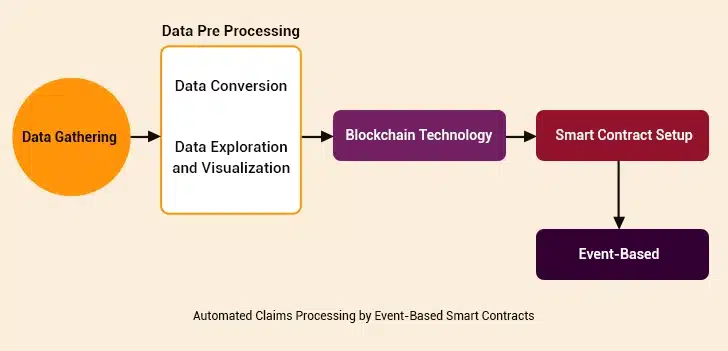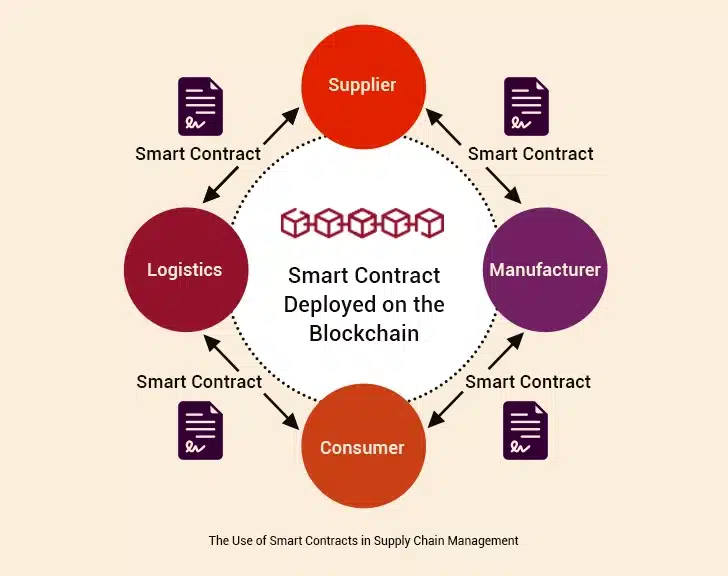One of the common challenges that enterprises, both large and small alike, encounter when engaging with another party for business is the lack of trust. Owing to the lack of trust, enterprises are bound to sign a legal contract that is enforceable by law. However, the problem with traditional contracts is that they are cumbersome and exhaustive documents swamped with complicated terms and technical jargon that often act as a source of business or legal conflict. Furthermore, enterprises need to spend a substantial amount of time and money on intermediaries when finalizing contracts. The good news is that several new technologies have emerged in the past few years that are bringing a fundamental change in the conventional ways of managing contracts. Blockchain is one such technology that is replacing traditional contracts with smart ones.
As the name suggests, Smart Contracts are self-executing programs based on Blockchain technology that automatically trigger an action once predetermined conditions are met. The self-executing and self-enforcing nature of Smart Contracts not only solves the issue of mistrust between two or more parties engaged in a business but also simplifies trade amongst them without the need for an intermediary. In other words, Smart Contracts build trust and transparency between the parties by allowing them to securely exchange digital or physical assets. As technology evolves, more enterprises are likely to leverage its potential to streamline business processes. Furthermore, the global Smart Contract market is estimated to reach 2.5 billion USD by 2032.
Table of Contents
What are the Real-World Use Cases of Smart Contracts?
What are the Different Types of Smart Contracts in Blockchain?
What are the Key Benefits of Using Smart Contracts?
What are the Real-World Use Cases of Smart Contracts?
Today, every business wants to automate their processes along with streamlining existing workflows, hence they are considering decentralized application development to leverage the potential of Smart Contracts. Take a quick look at various industries where the applications of Smart Contracts are revolutionizing operations.

1. Insurance
The insurance sector is notorious for handling the maximum number of disputes. The reason behind this is the lack of automated administration in the insurance space, and owing to this, it takes several weeks or a few months for an insurance company to process and settle claims. The delay in processing claims is infuriating for both insurance companies and their customers, which in turn leads to high customer churn.
With the help of Smart Contracts, insurance companies can expedite the claim settlement process by automatically triggering a claim when a certain event takes place. For instance, if a car met with an accident, the Smart Contract technology would quickly recognize it by leveraging an array of technologies and initiate the claim process shortly after the accident. The prerequisite details, such as the car number, the location where the accident took place, and the extent of damage, will be recorded on the Blockchain network. This will not only help in determining fair compensation to policyholders but also ensure no fraud is committed in the process. With automated claims settlement, insurance companies can cut down on high insurer costs, which in turn leads to lower premiums. In a nutshell, insurance companies can take advantage of Smart Contracts that allow them to process and settle claims way faster than through their traditional manual processes.
2. Supply Chain Management
The traditional supply chain process is highly inefficient since it involves a lot of paperwork that needs to go through a slew of approval channels. Moreover, there are high chances of data loss and forgery in these traditional processes. Businesses operating in this domain can avert such risks by designing a Smart Contract for end-to-end supply chain management. This self-executing contract can operate autonomously, providing full visibility and transparency of the flow of goods to all the participants across the supply chain network. If any item is lost during the process, the Smart Contract automatically triggers pre-defined escalation measures, which in turn, reduces disputes between vendors and retailers in the supply chain.
Businesses using Smart Contract development in the supply chain can take their inventory tracking to the next level while reducing the chances of theft and fraud. Walmart, the leading retail company in the United States, has already introduced Smart Contracts and Blockchain to manage its supply chain. Similarly, The Home Depot cuts down the significant amount of time it takes to resolve vendor disputes using Smart Contracts and Blockchain technology.
3. Real Estate
Another application of Smart Contracts in Blockchain is in the real estate vertical. Using Smart Contracts, both the parties (buyer and seller) can not only automate the deal to buy, sell, or rent properties but also expedite the process of change of property ownership whilst ensuring secure P2P transactions. For this to happen, the property needs to be digitized on the Blockchain network. Let’s understand with the help of an example, once the buyer pays the agreed amount to the seller, the Smart Contract would operate autonomously and change the property ownership based on the payment information recorded on the Blockchain network.
How AI is Revolutionizing Smart Contracts in Real Estate
4. Financial Data Recording
Financial data is critical for every business, irrespective of the size or industry vertical. Enterprises can use Smart Contracts for transparent and accurate data collection, which eliminates the need for exchanging other business documents, resulting in streamlined administrative workflows. In other words, managing the uniform recording of financial data becomes a breeze using Smart Contracts, which in turn reduces costs for reporting and auditing. These self-enforcing contracts can automatically execute set financial rules without requiring any intermediary, saving a significant amount of accountants’ time.
5. Healthcare
Smart Contracts emerge as a transformative solution in the realm of healthcare data management, offering a secure and decentralized framework to overcome the intricate challenges associated with patient information. These contracts are meticulously tailored to the unique needs of healthcare organizations, such as overseeing consent agreements, access permissions, and data-sharing protocols within EHRs while ensuring that patient data is handled with the utmost sensitivity and in compliance with stringent regulations. Furthermore, the automation of data-sharing agreements and consent forms not only reduces administrative complexities but also streamlines the process, making healthcare data-sharing more efficient. In a nutshell, Smart Contracts have brought a revolutionary shift in healthcare data management, promising increased efficiency and security while prioritizing regulatory compliance.
What are the Different Types of Smart Contracts in Blockchain?
Not all Smart Contracts work the same way. Some handle money, while others manage ownership or data. Here are the main categories businesses use to automate different kinds of agreements on Blockchain networks.
| Type | How It Works | Best for |
|---|---|---|
| Smart Legal Contracts | Enforce legally binding terms with automatic execution when conditions are met. | Real estate, insurance, business agreements |
| Decentralized Autonomous Organizations | Member-governed organizations where rules are encoded in Smart Contracts. | Community projects, decentralized governance |
| Tokenization Contracts | Create and manage digital tokens on Blockchains. | DeFi, NFTs, asset tokenization |
| Logic/Application Contracts | Execute predefined logic for apps. | DApps, gaming, automated workflows |
The Ultimate Guide to DeFi Smart Contract Development
What are the Key Benefits of Using Smart Contracts?
Smart Contracts help make agreements safer and easier to manage. They work automatically when conditions are met, removing the need for middlemen. Below are the key benefits that make them useful for businesses in different situations.
I. Everything Happens Automatically
Smart Contracts work on their own without anyone having to do anything manually. Once you set up the rules, the contract follows them exactly as written. When the right conditions are met, Smart Contracts execute the agreement instantly. This means you can act immediately without having to wait for someone to check papers or approve anything. This automatic process makes everything much quicker and smoother.
II. Fast Processing
Everything happens quickly with Smart Contracts. Traditional contracts can take days or weeks to complete, but Smart Contracts finish in minutes or even seconds. There is no waiting for paperwork to be reviewed or for people to sign documents. The contract processes everything immediately when the conditions are right. This speed helps you get things done quickly.
III. No Human Mistakes
Smart Contracts don’t make the same mistakes that people do. Humans can forget things, make calculation errors, or misunderstand instructions. But Smart Contracts follow their programming meticulously every time. They don’t get tired, confused, or distracted. This accuracy means your agreements work perfectly as planned. You can trust that everything will happen exactly as you agreed.
IV. Complete Transparency
Everyone involved can see exactly what the contract does and how it works. All the rules and conditions are written clearly in the code. There are no hidden terms or secret agreements that might surprise you later. This openness builds trust between all parties. You always know what to expect and when things will happen.
V. No Need for Middlemen
Smart Contracts work without any middlemen or third parties. This means you don’t need banks, lawyers, or other people to help complete your deals. The contract handles everything by itself. This makes the whole process much faster and affordable. You can directly deal with the other person without worrying about extra fees or waiting for approvals from others.
VI. Saves Money
When you use Smart Contracts, you spend less money on fees and charges. Since there are no middlemen involved, you don’t have to pay them for their services. The contract runs automatically, so there are no extra costs for processing or handling your agreement. This helps you save more money instead of spending it on unnecessary charges.
VII. Always Available
Smart Contracts work all the time, every day of the year. They never take breaks, holidays, or sick days as humans do. You can make deals or complete transactions whenever you want, even at midnight or on weekends. The contract is always ready to process your request instantly. This constant availability makes business much more convenient for everyone involved.
VIII. Safe and Secure
These contracts are extremely difficult to hack or change. They use strong computer security that protects your agreement from miscreants. Once the contract is made, nobody can alter it without proper permission. This security gives you peace of mind when making important deals.
IX. Cannot be Changed Easily
Once a Smart Contract is created and agreed upon, it becomes hard to change or cancel. This protects everyone from someone trying to cheat or back out of the deal unfairly. The contract stays exactly as originally written and agreed. This reliability ensures that all parties stick to their promises. Nobody can suddenly change the rules in the middle of the agreement.
Drive Business Impact with Damco’s Expertise
Smart Contracts have unmatched potential to disrupt almost every industry by eliminating the need for intermediaries. Using Smart Contracts, enterprises can not only automate and streamline their processes but also harness many other business benefits, including better transparency, improved speed and efficiency, enhanced security, and more. If you are also planning to build decentralized applications that use Smart Contracts, you may hire seasoned developers from reliable Blockchain Smart Contract companies like Damco.
Case in Focus
A leading supply chain player in the United States was facing several challenges in its operations, including delays, disputes over contract terms, and difficulties in tracking and verifying shipments. The client had been using paper-based contracts and manual processes; however, they were contributing to reduced efficiency and increased operational costs. To overcome these challenges, the client partnered with Damco Solutions to integrate Smart Contracts into their supply chain management system. Leveraging Blockchain technology, Damco’s seasoned professionals developed an automated, decentralized system that executed and enforced contract terms automatically. With Smart Contracts implementation, the client eliminated manual processes, minimizing delays and cutting operational costs by nearly 45%.
FAQs
Q. What exactly are Smart Contracts?
A. Smart Contracts are like digital agreements that run on their own. Think of them as computer programs that execute deals when certain conditions are met, without needing middlemen. If you sell something online, a Smart Contract could release your payment as soon as the buyer confirms they received the item. It’s meant to make deals fast and reliable.
Q. How do Smart Contracts work on the blockchain?
A. Smart Contracts work by storing agreement rules as computer code on the blockchain network. When specific conditions are met, Smart Contracts automatically execute the predefined actions. Since the blockchain is shared across many computers, everyone can verify what happened. This makes the whole process transparent and nearly impossible to manipulate.
Q. Which blockchain platforms support Smart Contract development?
A. Ethereum is probably one of the top Smart Contracts platforms, but it’s not the only one. You have options like Avalanche, which is fast and scalable, and Tezos, which lets you upgrade contracts easily. Binance Smart Chain is popular since it’s compatible with Ethereum but costs less to use. Newer platforms like Aptos and Sui are trying to solve speed and cost problems that older blockchains have.
Q. What risks or vulnerabilities exist with Smart Contracts?
A. The biggest risk with Smart Contracts is that they are only as good as the people who design them. Coding errors can lead to major financial losses, and since these contracts often can’t be changed once they are live. Hackers actively look for weaknesses to exploit, and even small mistakes in the code can have huge consequences when real money is involved.








